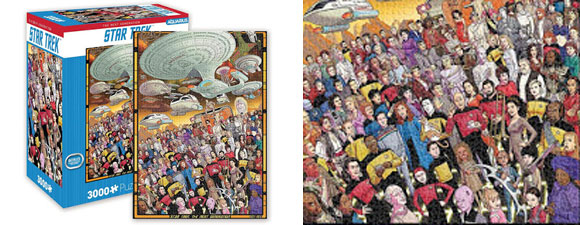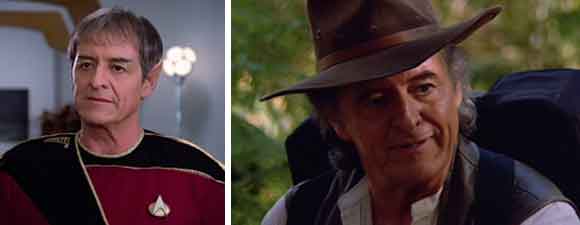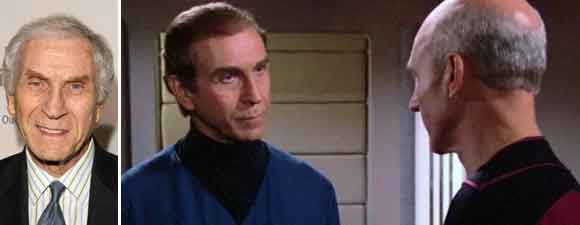Retro Review: Journey’s End
8 min readOn a mission to relocate a group of Native American settlers from a planet ceded to the Cardassians, Wesley Crusher decides to leave Starfleet.
Plot Summary: Admiral Nechayev comes aboard the Enterprise to tell Picard that, due to a new treaty with the Cardassians that has created a demilitarized zone, the colonists on the planet Dorvan V must be removed and resettled. Picard observes that the inhabitants are Indians from North America who spent centuries looking for a homeland after being forced off their lands on Earth, but Nechayev says that there is no choice to maintain the fragile peace with the Cardassians. Meanwhile, Wesley Crusher arrives aboard the Enterprise for a visit, but is sullen to his mother and rude to LaForge. While the tribal council tells Picard that they will not leave Dorvan V, an Indian named Lakanta tells Wesley that he saw Wesley in a vision quest and believes that Wesley himself should seek a vision of his future. Because he has been unhappy at the Academy, Wesley agrees, and sees a vision of his father, who says that Wesley has reached the end of his present journey and should not follow Jack Crusher’s path any further. While Wesley becomes angry at the Enterprise crew’s orders to remove the Indians against their will, Picard learns from elder tribal member Anthwara that a Picard ancestor was involved in the slaughter of Native Americans in New Mexico and that Anthwara believes Picard has been sent not to fulfill Starfleet’s evacuation order but to make amends. When a group of Cardassians beams down to begin a survey of the planet, Picard reminds them that the Indians are under Starfleet protection and asks them not to make a difficult situation worse. When Wesley finds Worf beginning preparations to beam the Indians to the Enterprise without their knowledge, he warns the Indians. Since Picard is furious, telling Wesley that as long as he wears the uniform he must obey Starfleet orders, Wesley promptly resigns from Starfleet. Beverly Crusher is concerned but tells her son that the Traveler once said Wesley was destined for a more extraordinary path. When he returns to Dorvan V to find the Cardassians and settlers pulling weapons on one another, Wesley is able to freeze time, at which moment the Traveler appears to tell him that he has taken the first step toward life on another plane of existence. Picard persuades Evek to allow the Indians to remain on Dorvan V under Cardassian control, telling the settlers that they will no longer be Federation citizens if they choose to stay. Wesley stays with them to study their vision quests.
Analysis: I understand the practical reasons for writing “Journey’s End,” which simultaneously wraps up Wesley Crusher’s long dramatic arc and begins a new one involving the Cardassians, the Federation, and the group of displaced resisters who will become known as the Maquis. The resentment over the seemingly arbitrary redrawing of boundaries and handing over of planets to the Cardassians for a peace that few believe will hold creates the foundation of drama for the next several seasons of Deep Space Nine and Voyager, leading to some of Star Trek’s finest episodes; I’m certainly not sorry that it happened, nor that the writers decided finally to address the Traveler’s prediction that Wesley would become a prodigy far surpassing the abilities of other humans. Yet “Journey’s End” is a clumsy, uneven episode in which both Native American descendants and human potential are treated with condescension and cliches, as if the writers couldn’t really be bothered to spend the time on the sort of historical research they claim the Indians value so highly. Wesley leaves in a cloud of mumbo-jumbo that seems like the antithesis of what Star Trek stands for, in a decision that sounds both rash and immature. It’s neither an auspicious send-off for a character who, admittedly, was as loathed as liked by fans, nor a promising beginning to a situation that the franchise is depending upon to spark conflict and draw in viewers for its two new TV shows.
Even as a longtime fan, I didn’t understand what had supposedly happened during the Cardassian War until long after the fact, in Pocket Books’ novels which aren’t even considered canon. The rise of the Cardassians as the archenemy of the Federation must have been even more vexing for casual viewers. We heard about atrocities as far back as “The Wounded,” but we never got an explanation of whether there had been a declared war, a series of border skirmishes, a conflict where the official governments routinely blamed rogue factions for attacks on civilians; we never had an explanation of why, if the Federation had been at war with Cardassia, they weren’t more involved in the plight of the Bajorans before the discovery of the wormhole; we never received any retrofitting of the Cardassians into the rich fictional history of the Klingons, Romulans, Ferengi, etc. So it’s difficult from the start of “Journey’s End” to take Nechayev at her word when she tells Picard that uprooting and resettling various Federation colonists is the only way to maintain the peace with this deadly enemy. Picard isn’t much persuaded and the Indians don’t buy it for a second, which makes Starfleet look naive at best, downright stupid at worst. No wonder Wesley is thinking about leaving. The Native Americans claim they settled on this particular planet because the mountains and rivers spoke to them – their beliefs are written as a mess of tradition that comes across as both ignorant and patronizing on the part of the writers – but I can’t help wondering about the policies that drove them so far out in the first place, to a planet that must have been on the border of Cardassian space long before it was swallowed up into the Cardassian Empire itself. Did these people really feel so uncomfortable within the Federation that moving to the Cardassian border seemed like a good idea? That fact and the ease with which the Cardassians agree to let them stay suggests that we’re only getting a bit of the full picture, which remains maddeningly elusive all through the next war.
How convenient that the Federation redrew its borders with the Cardassians to keep planets it considered of strategic or material value, and agreed to give away those settled by colonists already defined as marginal. Nechayev and even Picard offer some “too bad, so sad” lip service while declaring that resettlement is necessary to keep the peace for lots of other people far away, including the very people who drove the Indians out of their home and into space in the first place. But even Picard seems willing to do Starfleet’s bidding until he’s given the equivalent of white man’s guilt by one of the Indians, who seems to have asked about Picard’s background precisely in the hope that he can dig up some dirt like Picard’s murderous ancestor and use it to manipulate Picard. That scene really bothers me: it’s as if Anthwara doesn’t believe it’s possible or practical to deal with Picard as an individual or a Starfleet captain, so he decides he must place upon Picard a sense of responsibility for something that happened more than five centuries before his birth. There’s no excuse for the way Europeans treated Native Americans, and no one should need to feel a sense of personal, familial responsibility to vilify that aspect of American history. To insist that Picard must help the settlers by way of reparations for a generations-old stain upon his own family honor suggests that there could be a tit-for-tat form of restitution, which reflects as badly on Anthwara as it does on Picard for buying into it. For once Wesley – who reacts from the gut when he sees Worf plotting to beam the settlers up without even warning them – seems entirely sympathetic, and not particularly less sophisticated in his approach to the problem.
But then the episode takes a crazy spin, because the Traveler shows up and suggests that this erupting conflict – which comes to a head when weapons are fired – is just a chapter in the personal evolution of Wesley Crusher, who is so important that he can’t get involved in the day to day affairs of the little people and has to let them work it out for themselves. I’m all for Wesley, who’s been a Starfleet officer since he was legally underage, exploring other paths than those expected for him. What we’re seeing, though, is not a thoughtful young man who’s questioning his path at a fundamental level, but a kid who’s always tried to please others having a belated adolescent rebellion. Wesley’s barely mature enough to take responsibility for getting a classmate killed, and not mature enough to be polite to his mother or mentor. We’re supposed to believe that he’s ready to move onto higher planes of existence, and to learn from people whom he’s just been informed he’s too far above to interfere in their battles? He’s going to turn into Q!
This is definitely not Picard’s finest showing as a leader. In addition to his failure to question whether Wesley is really ready to explore higher planes of existence when he hasn’t even finished his undergraduate degree – sure, it’s a piece of paper (or a notation on a padd), but it’s also a reflection that he made the commitment to go back and put in the hard work necessary to graduate after screwing up and failing to advance with his class – he doesn’t present the most obvious and necessary argument to the Indians: that if they don’t move, in all likelihood the Cardassians are going to destroy their village and possibly send them to work in the mines from which they’ve only recently been obliged to release the Bajorans. Picard has been honest, he’s told them why Starfleet wants them to move, why he personally wants them to move. There’s no question of a threat being false or unethical. By insisting that they’ll stay under Cardassian rule, the Indians are portrayed as just as inflexible (and in that regard just as immature) as Wesley. Picard has to be pretty certain that the presence of Cardassians in their territory will end the settlers’ way of life just as surely as a natural disaster, but he doesn’t present the facts; maybe he’s assuming the Indians did their own research, but I wouldn’t have taken that for granted. He helps to hatch what will become the Maquis rebellion; this peaceful, nature-loving civilization will end, but at least he’ll have the personal peace of mind of being able to say he didn’t use force on them. I wonder whether that counts as a moral victory.






